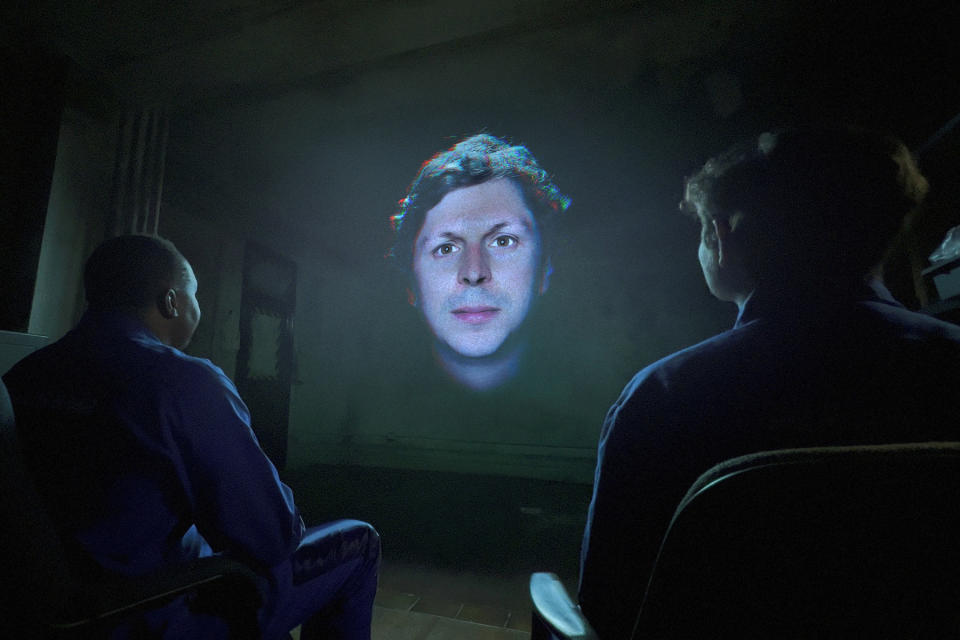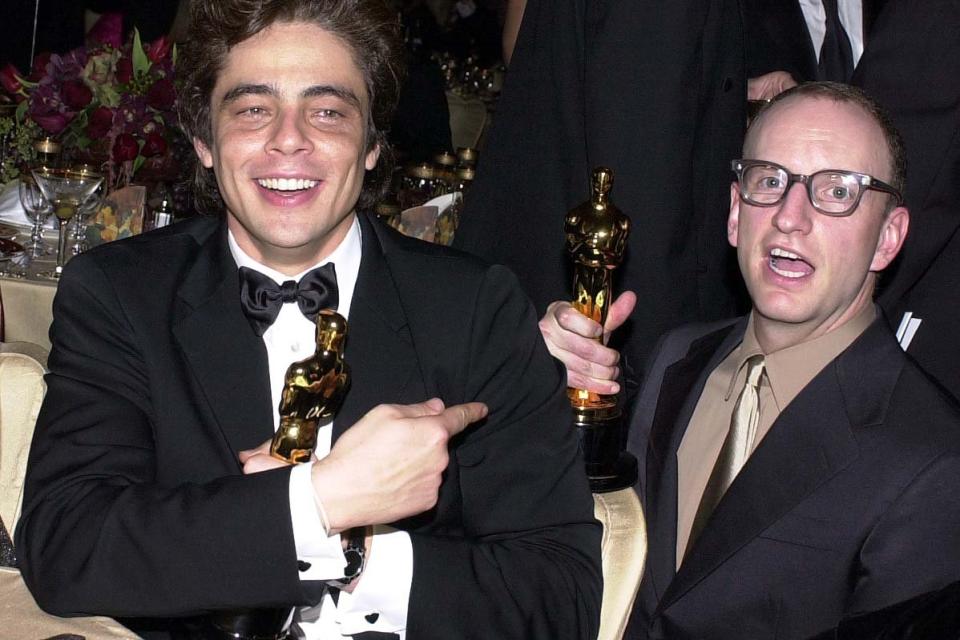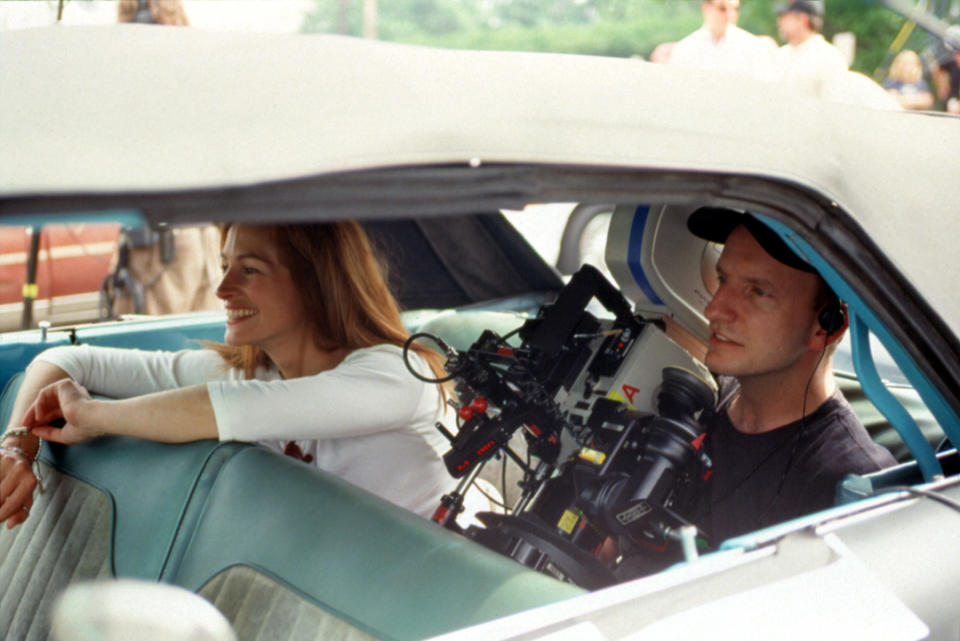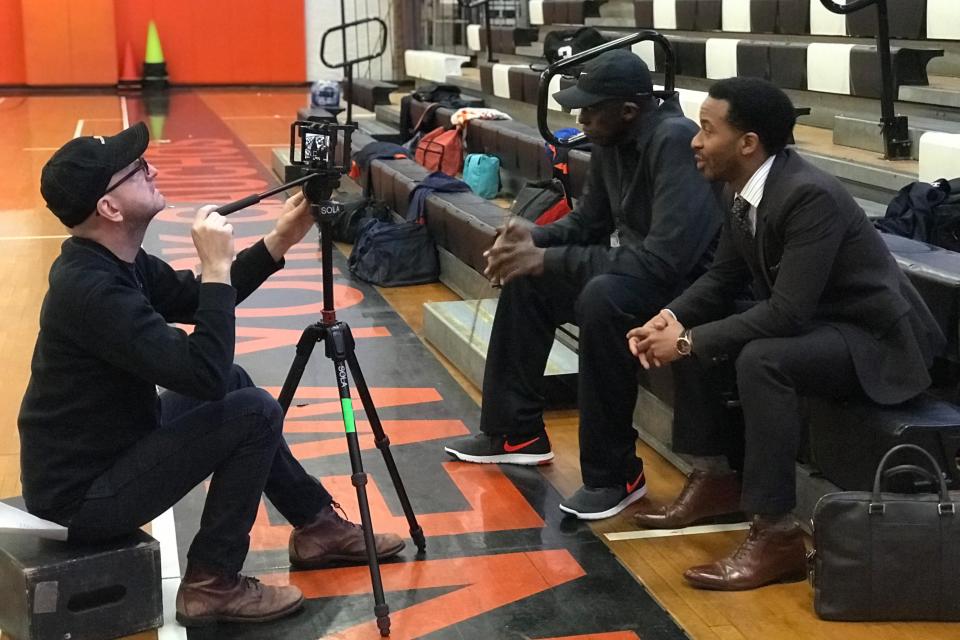Steven Soderbergh Talks Helping Christopher Nolan and Eating the Rich

His “retirement” a decade ago didn’t last. It couldn’t possibly. Steven Soderbergh is just too curious, too prolific, and far too in love with the work — the process of assembling a team to complete a herculean task, in particular — to hang it up. It’s a big reason why the 60-year-old filmmaker and television creator is a massive fan of Bravo’s Below Deck, about the crew of a charter yacht catering to its filthy rich clients’ impossible whims, and also why he’s constantly innovating. Over the past decade, he’s directed eight feature films (included two shot entirely on iPhones), orchestrated the 93rd Academy Awards, and created four shows, including the interactive app/murder mystery Mosaic.
Soderbergh’s latest venture is Command Z, a satirical sci-fi series for the web. Inspired by Kurt Andersen’s book Evil Geniuses: The Unmaking of America: A Recent History, and developed with the author, the show follows a trio (Roy Wood Jr., Chloe Radcliffe, JJ Malley) who have been tasked by an AI version of a deceased mega-billionaire (Michael Cera) to travel back through time to change events and improve the planet. Among their missions: persuading an avaricious finance god (Liev Schreiber) and a rising politician (Succession’s Zoe Winters) to care about climate change. It’s fast, fun, and inventive — three things Soderbergh excels at. For only $7.99, you can watch the entire series, and all the proceeds will go to two organizations: Children’s Aid and the Boston University Center for Antiracist Research.
More from Rolling Stone
Ed Sheeran Warns Against AI: 'Have You Not See the Movies Where They Kill Us All?'
'Gilmore Girls' Actors Sound Off on Netflix Over Show's Streaming Residuals
In a wide-ranging conversation, Soderbergh talked with Rolling Stone about the ongoing Hollywood strikes, the lack of transparency in the streaming biz (and how residuals work), and the important role he played in boosting Christopher Nolan’s career early on.
What about the pandemic — and the world — these past few years brought Command Z out of you?
It was really Kurt’s book that got me thinking about a project to activate people, or at least get them thinking about taking some sort of action. I think everybody is in a place now where our default mode is to feel completely overwhelmed. You don’t have the psychic real estate to engage with all the things that need attention. I read Kurt’s book and thought, oh, this is a really smart, clear explanation of what’s been going on, partially in the background but a lot of it in the foreground, over the past 40 years to drive a lot of the issues that we’re confronting now. One of the main ones being, obviously, the increasingly wide gap between people who have a lot of money and people who don’t, and the trickle-down effect that has on the world.

And the series was initially conceived as a number of TikTok videos?
We wanted it to be in a form that is familiar, and easily digestible, and doesn’t feel like vitamins. We originally envisioned it as things designed to be watched in that [TikTok] format that were from the future — the year 2036. We wrote a bunch of those, shot a bunch of them, and determined that they didn’t work. They weren’t accomplishing what we hope to accomplish, and that format wasn’t familiar enough to us to look fluid and look organic. So, we threw all that stuff out, started over again, and tried to build a more traditional show. A 90-minute TV series chopped up into eight parts felt like more of a web series.
It’s sort of similar to what Quibi was trying to do format-wise, albeit done more successfully on your part. Not to invite that comparison.
Yeah, potentially. I was involved with a project [Wireless] as a producer that was on Quibi and was very curious to see where it would go. They were the victims of some really, extraordinarily bad timing. They were literally dropping these things as the headlines were filled with Covid. I know from experience that when something goes right, and you try to go back and analyze, “Why did that work?”, it’s mostly because nothing went wrong. The intention of this is a little different because it was not designed to be a commercial enterprise. The company that we formed to make it was a nonprofit organization, so it’s intention from the beginning was to make something, put it out there, and draw attention to some issues and organizations that are worth paying attention to. It was the first time I was involved in something where I felt having the logo of a giant company in front of it would seem at odds with its purpose.
Command Z takes aim squarely at the billionaire class. Did your experience making The Laundromat open your mind up to the shady stuff the filthy rich get up to, and did it bleed into this?
Yeah. You can see throughout my career that I’ve had an interest in institutions, and what happens when individuals try to go up against institutions — or any codified political structure that survives on keeping people controlled. Over the last decade, I’ve noticed that while that is still an issue, there’s an even larger issue that’s functioning on top of that: the increasing influence of individual wealthy people and how they exert power over these institutions and over our political environment. I thought that I needed to readjust my lens a little bit and move beyond the institution-versus-an-individual idea.
This reminds me of some statements Disney chief Bob Iger recently made from the Sun Valley Conference, or the “billionaire summer camp,” saying those on strike in Hollywood were making “not realistic” demands and saying they were exacerbating industry problems brought on by the Covid pandemic. To make those statements in golf clothes at the “billionaire summer camp” when you’re worth $800 million is pretty wild.
Yeah. The optics of that are bad. I was just saying this to someone yesterday regarding this whole situation: It’s impossible to figure out what’s fair if you don’t know what’s real. And the fact of the matter is, we don’t know how these companies are functioning in this specific context, which is a large-scale subscription streaming platform. They will not open the books, so how do you figure out what’s fair if you don’t know what’s going on? And it’s obvious they don’t want to open the kimono here and let us see what’s happening. It’s a uniquely complex and frustrating situation.
Right. There’s no transparency regarding streaming viewership numbers, so these streamers are sort of operating on a pay-what-we-want approach regarding residuals — if you even get any.
It’s clear that they use the data when they want to. If you have an ad-tier version of your app, and you go to Procter & Gamble and say, “I want $200,000 for commercial pod number two in this show,” they’re not going to take your word for it. You’ve got to show them something that proves it’s worth $200,000. So, when they want to use this information, they use it. Now, I want to be clear about something: We all took the money. We all did. And we’ve been saying for years, “This is not sustainable.” Look at John Landgraf talking six, seven years ago, saying, “People, you can’t keep this thing going! This trajectory can’t just keep going up.” There was always going to be a reckoning. The question is: If there’s going to be a reckoning, it’s got to be with hard information. We’ve got to know what’s real. I think it’s the third rail for them, and I don’t know where we go from here.
You’ve made a bunch of shows and movies for streamers, so how have residuals for you in the streaming era compared to residuals pre-streaming where the project was released theatrically and went the standard route? I’ve heard a lot of streaming deals are just upfront deals where you don’t receive residuals.
You get a buyout number. There’s your salary, which is fairly established — whatever your quote is, or whatever you got on the last thing — if you’re talking about a movie that’s traditional, and not a movie like Let Them All Talk where you’re making it independently and then selling it. So, if Netflix is paying you to make something, you have your salary, which is in line with what’s normal, and then there’s a buyout number that’s tacked on to that. Now, the question is, how do you ascertain whether or not that buyout number exceeds what you would have gotten in normal residuals over time or not? It depends on the success of the project, but how are we defining success here?
As a hypothetical: Ocean’s Eleven, at the point of my career that I’m at in 2001, if you take what my fee was and then a buyout on top of that quote, I can tell you now that my residuals would have dwarfed the buyout number, because the Ocean’s movies are in constant rotation everywhere in the world. That’s not typical. I’m somebody whose films perform all over the place — sometimes they perform great, sometimes they perform terribly. On a movie like The Good German, taking a buyout would’ve worked better for me and worse for the people paying for the movie. The problem is, we can’t get this information, but adding up all of the buyout dollars that have been paid to talent in the subscription model versus what people would have been paid in residuals under a normal model is hard to figure out, because again, there are assumptions being made in the streaming world that are difficult to make. You’ve got to come up with your company’s version of what the value of an eyeball is. Let’s say I make a movie for a streaming platform and it costs $30 million. The data comes back a year later: Thirty million people watched it. That doesn’t mean any revenue came in, so you have to decide internally, “Was that worth it?” Then, there are other things attached to it: cultural chatter, awards. We’ve moved out of a Newtonian economic world and into a quantum world where you get to make things up. This is where it gets tricky: If I don’t know, and I’m not being told how the platform views the cost-per-eyeball ratio, it’s hard to determine what a success is.

In Command Z, you have Michael Cera playing an AI version of a mega-billionaire. And I know AI is a major factor in the ongoing union strikes in Hollywood, but from a purely artistic standpoint, I have very little interest in something AI-generated. If you divorce artistic creation from the human experience, I don’t see what the artistic value is. It’s someone giving an algorithm prompts to remix existing material into something else.
I got a lot of heat a few weeks ago for saying something similar to that. I do not think it will replace humans in this specific context in a way that will result in good art. I just don’t. I’ve played with it. I think it’s interesting. Its limitations are glaringly obvious. Life experience. There’s a no man’s land that cannot be crossed, and will never be crossed, because it’s built on things that have already happened, and its inputs are images and text and that’s it. As an iterative tool, it has some interesting capabilities, but we’re better at doing the thing that we’re asking it to do. We just are, and we always will be.
Do you agree with the famous Balzac quote, “Behind every great fortune lies an equally great crime?”
Well, I’d say that’s generally more true than not. And here’s an interesting example of when it’s not: when the artist becomes wildly successful. Jim Cameron has a lot of money because a lot of people go to see his shit — and nobody got screwed, and nobody got exploited. Or with an athlete. LeBron James has a billion dollars, and he fuckin’ earned it! And nobody got hurt! Strangely enough, the exceptions seem to be in the sports and entertainment worlds on the talent side, where people made a lot of money because a lot of people paid to see them. I don’t know. I don’t think Jeff Bezos has committed a crime. I don’t think Amazon was built on a crime.
But I think with something like Amazon or Apple it would be exploiting its workers — particularly factory workers.
I would like to think if we were running that company, we’d be more sensitive to the experience of people working for us. I’m sensitive to the experience of people working for me, but I’m saying that as somebody who doesn’t run a trillion-dollar corporation.

I read that you played a fairly large role in Christopher Nolan’s transition from independent to studio filmmaking. A lot of people don’t know about this.
What happened was, I got a call from Chris’ agent, Dan Aloni, who I had known because he screened Memento for me after Memento couldn’t find a distributor after being on the festival circuit for a year. Dan calls me up out of the blue and says, “Could you watch this movie? I have this client of mine who has this movie, and we think it’s really good, but nobody will pick it up and we don’t understand why. Maybe we’re all crazy.” I see the movie, and I think it’s a fucking instant classic, and I go, “Well, this is really depressing.” I was really upset when I got out of there. It turns out that the financiers, Newmarket, opened their own distribution company and made $25 million on it.
Cut to months later, Dan calls me and he goes, “Look, there’s this script over at Warner, Insomnia. Chris is really interested in it, but Warner won’t take the meeting.” And I go, “What do you mean they won’t take the meeting?” And he goes, “Well, the executive there didn’t like Memento.” And I said, “Well, so what? Why won’t they take the meeting?” So, I called that executive and I said, “Take the meeting. You’ve got to take the meeting.” And he goes, “But I didn’t like the movie.” And I go, “Well, did you like the movie-making?” And he goes, “Well, yeah, it’s brilliantly made.” And I go, “Take the meeting.” That is all I did. I knew Chris well enough to know that if he gets in the room, he’s going to get that job. The executive came back and said, “I really love Chris.” And I go, “Well, yeah.” And he asked if Section Eight would come on as producers, and I said, “Sure.” That was it.
That’s pretty big! In Command Z fashion, you may have altered the course of film history.
Well, yeah, it started a very fruitful relationship [between Nolan and Warner Bros.], but let’s be clear: One way or another, Christopher Nolan is going to emerge. If he didn’t make Insomnia, he’d have made something else and still had the career he has. That was just a fortunate set of circumstances where I could get on the phone and advocate for him.
Did you do the Barbenheimer double feature?
I’ve only seen Oppenheimer. I’m halfway there. I couldn’t get into Barbie! But Oppenheimer is a real accomplishment. I read somewhere that Chris implied that this is the movie he’s been building toward, and I think he’s right. And I’m thrilled that it’s a massive hit. This is such good news for the movies — both of them, really. You have two blockbusters from directors who came out of the independent world who were given complete control over these large-scale projects, and they’re massive hits. This is exactly what Section Eight was trying to do 20 years ago, is hook up independent filmmakers with projects that could come out on 4,000 screens. That was our mandate. I’m so happy and just hope we can keep this momentum going.

You once said of the theatrical movie biz that, “Cinema is under assault by the studios with the full support of the audience.” And I know you said this about a decade ago, but do you still feel that way?
Yeah. I mean, look: We need audiences to show up for movies that are not just spectacles. We need audiences to show up in numbers for the kind of mid-level-budgeted movies made for grownups that I made my bread and butter on when I was growing up. Traffic and Erin Brockovich today, as theatrical releases, don’t work. It’s this weird chicken-and-egg thing: Audiences aren’t going because studios aren’t making them, and studios aren’t making them because audiences aren’t going. One of the factors here that nobody is really in control of, either the filmmakers or the studios, is the skyrocketing cost of marketing over the last 20-plus years.
Isn’t it also foreign box office? How much of this is about, say, cracking the Asian box office, which is now similar in size to the North American box office? You have studio products that are getting neutered to open in places like China. There’s no sex. Top Gun: Maverick doesn’t even have a villain. They never identify what country they’re from for maximum returns. And the films that open in places like Asia are not very talky and are heavy on the explosions and spectacle.
It’s an economic factor, for sure. It affects the level of risk involved. There’s a belief that the more culturally specific the film is that you’ve made, the harder road it’s going to have outside of the country. What’s interesting is, a portion of those numbers are inflated. The big, dirty secret of the theatrical-international release business is: You can’t get your money out of China. When somebody goes, “Oh, it grossed X in China,” OK, but they’re not going to hand that money to you.
They need Danny Ocean and his crew.
I know somebody that produced a movie that did very well over there, and when he went to collect what he was owed, they threw out a number to him that was a fraction of what he was owed, and he said, “Yeah, but this is the deal. I’m owed X.” And they kept repeating this number to him over and over until he realized, “What are you going to do? Sue the government?”
Roger Ebert once said that you’re possessed of an antagonism, to a degree, in the sense that you occasionally pursue projects as an exercise in humility. When we talk about Unsane and High Flying Bird being shot on iPhones, or the interactive Mosaic, or Command Z, how much of that is about you reinvigorating or challenging yourself?
I think it’s more about looking for new tools, and I’m willing to fail if I feel like I got a couple of good things out of it that I can use going forward. The key is: If you’re doing something that’s potentially polarizing to try and keep the risk level manageable and hope that you come out of it having learned a few things that you can apply to the next project. There’s a myth: “You make one for them and one for you.” No. They’re all for me, and they cross-pollinate. I learned things making the Ocean’s movies that I apply to the smaller, more experimental films, and there are things I learned on the smaller, more experimental films that I then apply to the larger films. They feed each other. But more than anything, my goal is to make something that annihilates the thing that I just did. I’m looking for an experience that is in opposition to what I just made. It keeps it alive. There’s got to be a pocket of terror, and you never want to stand on a set and feel, “I’ve been here before.”

Is that why you directed second unit on The Hunger Games? And what did you take away from that experience?
That was just Gary [Ross], who’s a friend of mine, saying, “Hey, would you come and do this?” And I thought, “Yeah, that would be interesting.” And it was, and I did learn a lot. I can tell you: I was so anxious. It was the [District 11] riot scene. I was very anxious because it’s one thing to go out there representing yourself, coming back, and feeling a certain way about what you got. I was terrified of letting Gary down and not delivering the material he needed to put that sequence together. And I didn’t hear from him for a while, and didn’t want to be that guy, so I didn’t call him. A couple of weeks later he called about something else and I go, “Gary … was the footage OK?” And he goes, “Of course. Yeah.” And I go, “OK, I just wanted to make sure!”
In Command Z, they celebrate Ron DeSantis Day, which would imply that he was once president. And I know this is satire, but —
Who knows! Florida could break off and become its own country. Who knows. Here’s the problem: In the last eight or nine years, we have witnessed the death of metaphor. There’s nothing you can make up that is crazier than what’s happening.
I think that’s why comedians had trouble satirizing Trump. They resorted to mimicry.
Yeah, exactly. This is new territory.
The $7.99 people pay for Command Z benefits two organizations: Children’s Aid and the Boston University Center for Antiracist Research. Why those organizations?
My father was an educator — a teacher, college professor, and academic — and if you have an interest in that field, what happens to children is critical in terms of their development and education. When I moved to New York 20-plus years go, I knew somebody who was connected to Children’s Aid, and any organization that is doing anything in its power to get young people to have a proper education, I’m into that. And then, like many people years ago, when I read Dr. Kendi’s book Stamped from the Beginning, I really started to think about how this birth defect that’s wound into this country could be addressed. And he answered the question by starting this center at Boston University, and I reached out to him and said, “I want to be involved. I want to help.” And the work they’re doing is extraordinary. Getting children educated and getting people to unwind the racism that’s still around us are two big subjects that I wanted to engage with.
What Ron DeSantis is doing in Florida — erasing Black history from school curriculums — seems like the opposite of that.
You just don’t even know what to say when a white person says that they’re upset, and they’re worried that their children will be upset, about what’s actually happened in this country. It’s shocking, and it’s not right, and you have to keep pushing back.
Best of Rolling Stone

